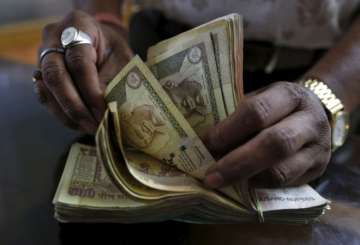The World Bank today decelerated India's growth for 2016-17 fiscal to a "still robust" 7 per cent from its previous estimate of 7.6 due to demonetisation, but asserted that the country would regain momentum in the following years with 7.6 and 7.8 per cent growth.
"The immediate withdrawal of a large volume of currency in circulation and subsequent replacement with new notes announced by the government in November contributed to slowing growth in 2016," the World Bank said in its latest report.
In its first report after November's demonetisation, the World Bank said, "Indian growth is estimated to have decelerated to a still robust 7 per cent (in fiscal 2017 ending on March 31, 2017), with continued tailwinds from low oil prices and solid agricultural output partly offset by challenges associated with the withdrawal of a large volume of currency in circulation and subsequent replacement with new notes."
Notably, India maintains the distinction of being the fastest growing emerging market economies of the world, bypassing China.
"India is expected to regain its momentum, with growth rising to 7.6 per cent in Fiscal Year(FY) 2018 and strengthening to 7.8 per cent in FY 2019-20," the Bank said, adding that various reform initiatives are expected to unlock domestic supply bottlenecks and raise productivity.
Infrastructure spending should improve the business climate and attract investment in the near-term, it added.
"The 'Make in India' campaign may support India's manufacturing sector, backed by domestic demand and further regulatory reforms. Moderate inflation and a civil service pay hike should support real incomes and consumption, assisted by bumper harvests after favourable monsoon rains," the Bank said in its latest report Global Economic Prospects.
"A benefit of 'demonetisation' in the medium-term may be liquidity expansion in the banking system, helping to lower lending rates and lift economic activity," the World Bank noted.
Noting that in India, cash accounts for more than 80 per cent of the number of transactions, the World Bank observed that in the short-term, 'demonetisation' could continue to disrupt business and household economic activities, weighing on growth.
"Further, the challenges encountered in phasing out large currency notes and replacing them with new ones may pose risks to the pace of other economic reforms (e.G. Goods and Services Tax, labour, and land reforms)," it said.
"Spillovers from India to Nepal and Bhutan, through trade and remittances channels, could also negatively impact growth to these neighbouring smaller economies," the Bank noted.
According to the Bank, India's growth in the first half of FY 2017 was underpinned by robust private and public consumption, which offset slowing fixed investment, subdued industrial activity and lethargic exports.
Latest Business News

